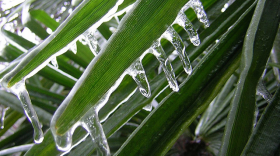DAVID GREENE, HOST:
The top U.S. diplomat in Ukraine, William Taylor, told lawmakers yesterday that he believed there was a shadow foreign policy operation in the Trump administration led by the president's personal attorney, Rudy Giuliani. Taylor also said the administration made military aid to Ukraine contingent on investigations that would help President Trump politically - in other words, a quid pro quo. The White House continues to deny this, and after Taylor's testimony, dozens of Republicans took to the House floor to slam Democrats over the impeachment inquiry. Let's begin our coverage with NPR White House correspondent Tamara Keith. Good morning, Tam.
TAMARA KEITH, BYLINE: Good morning.
GREENE: OK. So William Taylor's testimony - what did we learn about what he's describing as these informal channels for foreign policy?
KEITH: So what we know is from his opening statement - 15 pages, a very detailed timeline of conversations that he had with various people in both the formal and informal channels of foreign policy as relates to Ukraine. And he builds a case that President Trump wanted the president of Ukraine, President Zelenskiy, to state publicly - and this is important because it would help the president politically - to state publicly that his country would investigate both the 2016 election and a Ukrainian gas company linked to former Vice President Joe Biden's son. And what he says is that for a time, the informal system and the formal traditional system were going in the same direction. They were both in the best interest of the United States. But then there came a time when they split, when they diverged. And he says that he felt that the relationship between the United States and Ukraine was being "undermined by this irregular, informal channel of U.S. policymaking and by the withholding of vital security assistance for domestic political reasons." That was a quote.
GREENE: Well, that sounds like the very quid pro quo that President Trump has been denying explicitly. So how is the White House responding to this testimony?
KEITH: Well, they say there still is no quid pro quo. Stephanie Grisham, the press secretary, put out a statement saying that the president has done nothing wrong and, quote, "this is a coordinated smear campaign from far-left lawmakers and radical unelected bureaucrats waging war on the Constitution." She also called it politically motivated and said that today was just more triple hearsay. That was what she said of Taylor's testimony. It's worth pointing out that Taylor is a longtime diplomat, has been giving service to this country for 50 years, starting with West Point, serving in Vietnam and has served in administrations, both Republican and Democratic administrations, going back to Reagan.
GREENE: So House Republicans last night held what they called a floor speech rally to oppose the impeachment inquiry. It sounds like some, at least, are really sort of ramping up the defense of the president.
KEITH: That's right. And the president wanted that defense. And so these Republican members went to the floor, gave these one-minute speeches decrying the fact that this was happening behind closed doors and saying that it needs to be done out in public, that it simply isn't fair and isn't due process.
GREENE: NPR White House correspondent Tamara Keith for us this morning. Tam, thanks so much, really appreciate it.
KEITH: You're welcome. Transcript provided by NPR, Copyright NPR.








